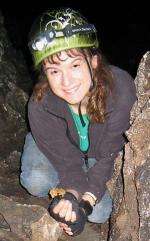Wiley, Anne
I use stable isotopes and other molecular tools to study the ecology of modern and ancient animal populations. My current research focuses on oceanic seabirds, which regularly traverse thousands of kilometers as they forage on a diversity of marine fish and invertebrates. Such seabirds can provide a unique perspective on oceanic food webs over the vast spatial scales at which they forage. They also provide a means of investigating interesting topics such as the relationship between genetic and foraging diversity in species that have few physical barriers to dispersal. Much of my work has involved developing a comprehensive, isotopic picture of the endangered, but poorly studied Hawaiian petrel (Pterodroma sandwichensis). This species is abundant in the Hawaiian sub-fossil record, and, through analysis of biomolecules preserved in modern and ancient remains, offers the ability to study multiple breeding populations over the course of millennia. My research on the Hawaiian petrel is addressing topics such as individual specialization, population-level foraging segregation, and human-induced changes to marine food webs. I am also interested in the topics of ecologically-mediated population divergence, salt loading in marine vertebrates, molt and feather growth, and radiocarbon dating.







